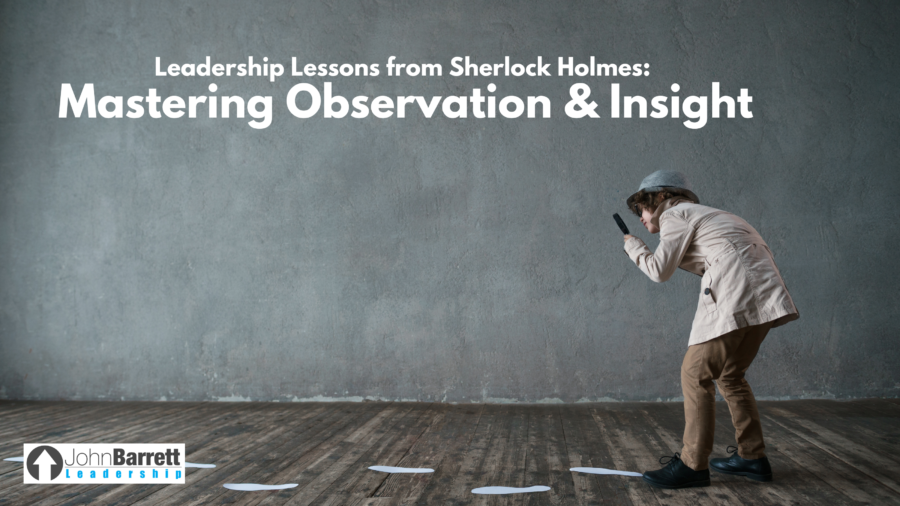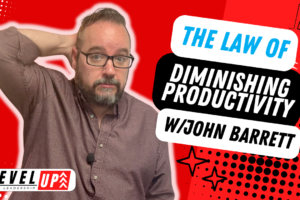Leadership Lessons from Sherlock Holmes: Mastering Observation & Insight
One of my favorite fictional characters is Sherlock Holmes, the legendary detective created by Sir Arthur Conan Doyle, renowned for his unparalleled observation, deduction, and understanding of human behavior. While Holmes’ methods were designed to solve complex crimes, they offer invaluable lessons for leaders seeking to understand their teams deeply. By adopting Sherlock Holmes’ strategies, you can enhance your ability to observe, listen, and empathize, thus fostering a more connected and productive team environment. This sense of connection will boost team morale and increase productivity and commitment.
Let me share three of Holmes’ techniques that you can install in your daily leadership:
The Power of Observation: “You see, but you do not observe.”
One of Sherlock Holmes’s most famous quotes, “You see, but you do not observe,” underscores the difference between merely looking at something and truly understanding its significance. As a leader, this means paying close attention to not just what is said but also to the unspoken cues and subtle signals that your team members convey. This heightened awareness will make you a more perceptive and empathetic leader.
Step: Develop a keen sense of observation.
Tip: Practice observation techniques with your team over the next few months to develop this habit.
Illustration: During a team meeting, instead of just hearing the status updates, observe body language, tone of voice, and facial expressions. A team member who avoids eye contact or seems unusually quiet might be struggling with something, even if they don’t voice it directly.
Listening to the Unsaid: “The world is full of obvious things which nobody by any chance ever observes.”
Holmes often solved cases by noticing what others overlooked. For you, this means listening to what is not being said and understanding the emotions behind the communication. This skill is crucial for uncovering your team members’ true sentiments. Peter Drucker, the father of modern-day management and author, said, “The most important thing in communication is hearing what isn’t said.”
Step: Listen for the subtext in conversations.
Tip: Pay attention to changes in behavior and mood, and ask open-ended questions to encourage deeper dialogue.
Illustration: If a usually upbeat team member seems withdrawn, gently inquire about their well-being. Ask questions like, “I’ve noticed you seem a bit down lately. Is there anything you’d like to talk about?” This approach shows you care and opens the door for them to share their true feelings.
Empathy and Connection: “It is a capital mistake to theorize before one has data.”
Holmes emphasized the importance of gathering information before forming conclusions. For you, this means understanding your team members’ perspectives and emotions before making judgments or decisions too quickly. Remember what Dr. Stephen Covey taught us as the 5th Habit of The 7 Habits of Highly Effective People: Seek first to understand, then to be understood.
Step: Practice empathy by actively seeking to understand your team members’ viewpoints.
Tip: Validate their feelings and provide support without rushing to offer solutions.
Illustration: When a team member expresses frustration about a project, listen attentively and acknowledge their feelings: “I can see this project has been challenging for you. Thank you for sharing your concerns. Let’s work together to find a solution.” This approach builds trust and shows that you value their input.
BONUS:
Quotes from Sherlock Holmes and Their Application to Leadership
- “When you have eliminated the impossible, whatever remains, however improbable, must be the truth.”
- Application: When problem-solving, consider all possibilities before concluding. Encourage your team to explore different angles and think creatively.
- “To a great mind, nothing is little.”
- Application: No detail is too small. Pay attention to the little things, as they often lead to bigger insights.
- “I never guess. It is a shocking habit—destructive to the logical faculty.”
- Application: Base your decisions on data and careful observation, not assumptions or guesses. Foster a culture of evidence-based decision-making within your team.
- “It is my business to know what other people don’t know.”
- Application: Make it your business to understand your team better than anyone else. This deep knowledge allows you to lead more effectively and empathetically.
Sherlock Holmes’ methods of observation, deduction, and understanding human behavior can teach you and me a great deal. Adopting a detective-like approach can uncover your team members’ unspoken emotions and concerns, fostering a more empathetic and connected team environment. Through keen observation, active listening, and a deep understanding of human behavior, you can enhance your effectiveness and create a supportive and productive workplace.
Implementing these strategies improves your leadership skills and builds a culture of trust, openness, and mutual respect. By becoming the Sherlock Holmes of your team, you can lead with greater insight, empathy, and success.









